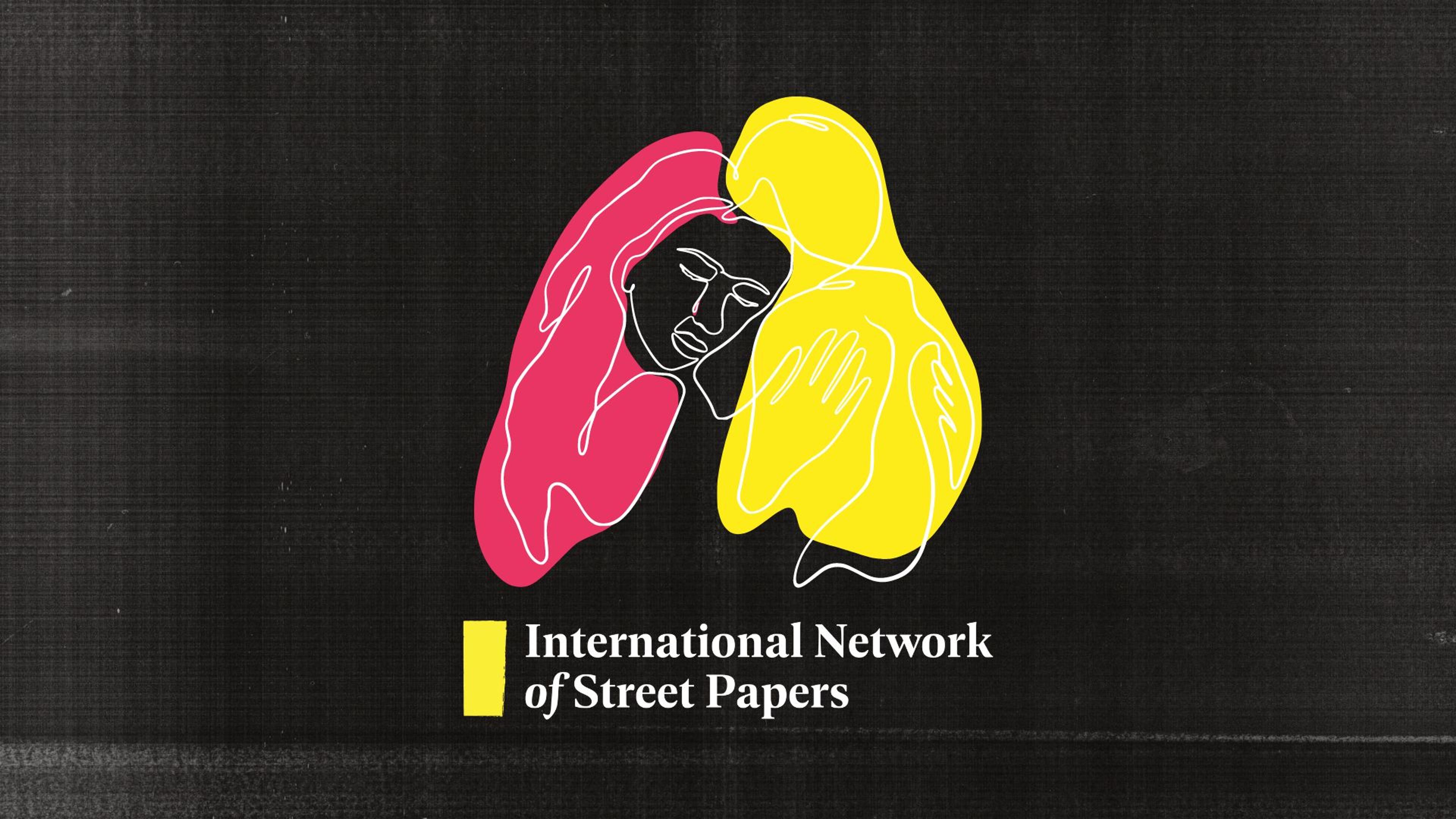Michelin star chef and food poverty advocate Massimo Bottura: “It is not about the quality of the food, but rather the dignity of people and the respect we have for the food in our hands”
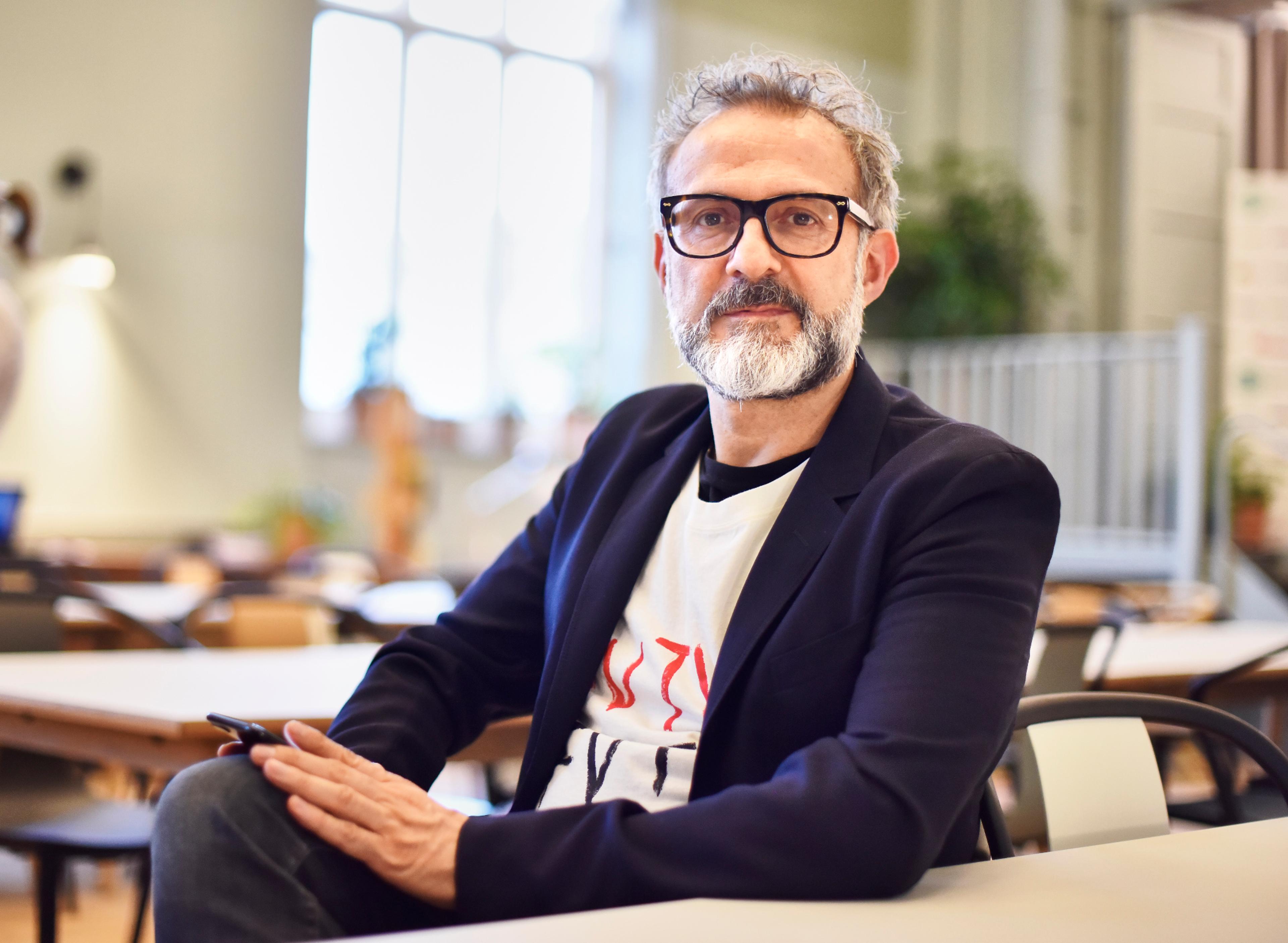
Massimo Bottura. Credit: Simon Owen Red Photographic.
By Tony Inglis
- News
As a multi-Michelin star awarded chef renowned worldwide for his innovative culinary creations and expertise reimagining cooking, Massimo Bottura has fed some of the best food to some of the world’s most rich and famous people. But in founding Food for Soul, a non-profit that values the health and well-being of the planet and its people through cooking, and the Refettorio Ambrosiano, a dining space for people experiencing homelessness and poverty on the outskirts of Milan, he was looking to use his skills and knowledge to give something back. Ahead of the first annual Global Street Paper Summit since before the pandemic, where delegates will eat at the Refettorio, Chef Bottura talked to the International Network of Street Papers about the power of communal dining and using food for good.
Anyone with an interest in high end food culture will feel a certain disconnect to its elitism while appreciating the artistry involved. It’s reasonable to be bowled over by the mouth-watering presentation, the belief defying taste combinations, and the dedicated work ethic, and still gawp at the level of money and inaccessibility associated with that world.
For Massimo Bottura though, the idea of equity and using the fame and respect he has earned in the world of haute cuisine to bridge the gap and address how food can make a difference has become the base ingredients of his work.
A multi-Michelin star awarded chef and restaurateur, best known for his exclusive Modena, Italy based restaurant Osteria Francescana (named the world’s best restaurant in 2016 and 2018), Bottura is a cook who has become a personality, featured on TV shows like Chef’s Tableand Master of None, and known for doing wild and wonderful things with the food of his homeland, like deconstructing a lasagne and forming it into something that more resembles alien plant life, and yet making it taste like the best lasagne you ever had, or calling one of his desserts ‘Oops! I Dropped the Lemon Tart’.
However, as his career has progressed, a passion to show how food and cooking could contribute to social change became more prominent. This manifested in the establishment of Food for Soul in 2015 alongside his wife Lara Gilmore, a non-profit that put this mission at its core. One of its driving forces was the creation of Refettorios – community kitchens which would tackle food waste and poverty, and feed people experiencing homelessness in a dignified way in the locales they were placed. The Refettorio Ambrosiana, housed in an abandoned theatre in Greco on the outskirts of Milan, opened first, and 12 more have followed.
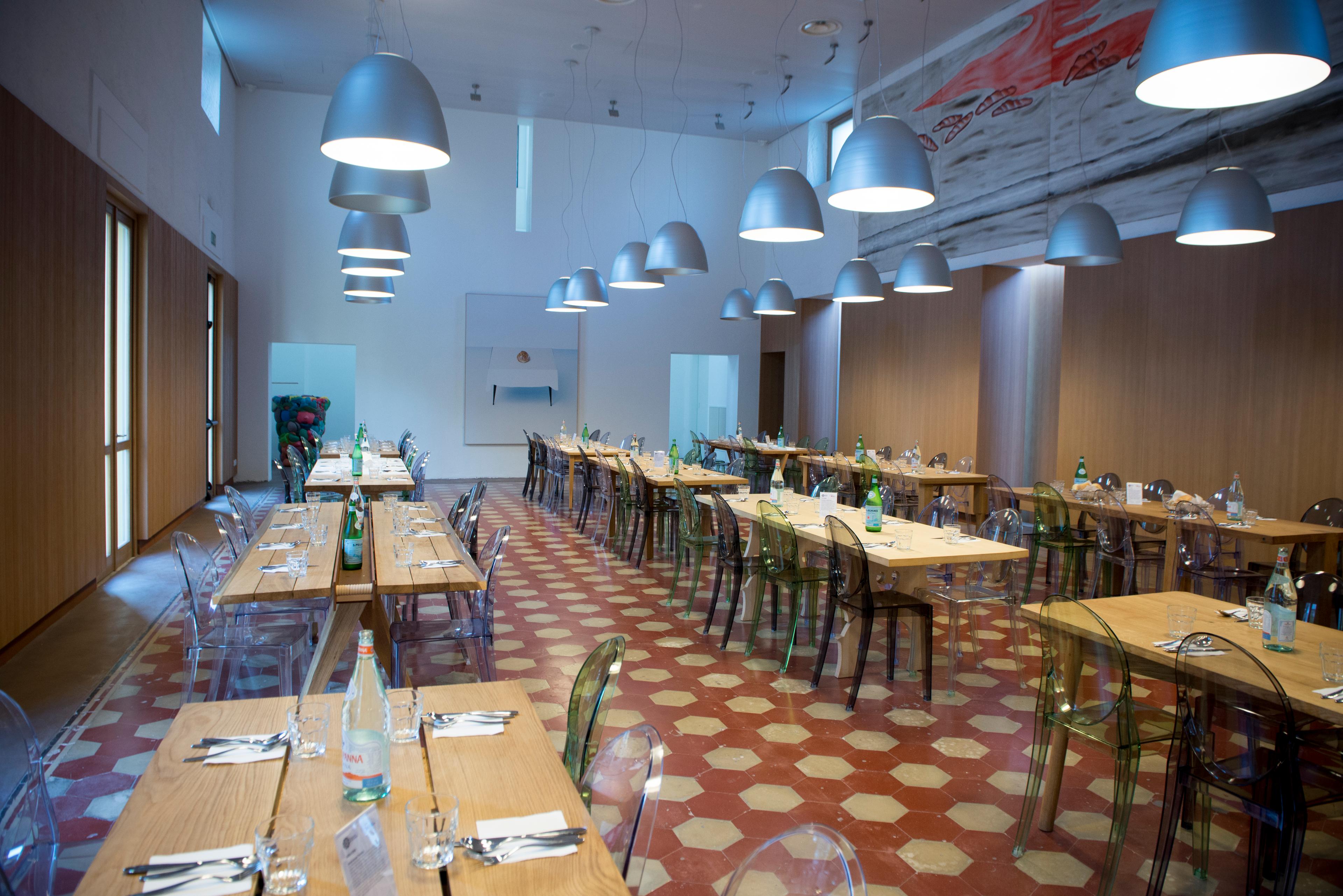
The dining hall at the Refettorio. Credit: Paolo Saglia.
When the International Network of Street Papers hosts the first Global Street Paper Summit since 2019, an annual event paused due to the pandemic, in Milan on 13 September, delegates from the world’s street papers will visit and dine at the Refettorio Ambrosiano for a chance to understand why those living in poverty should not be denied a quality meal or a chance to eat communally with others just because they are homeless or marginalised, conveying values that Bottura and street paper organisations and their staff share.
Ahead of the Summit, INSP spoke to Chef Bottura about how the Refettorio came to be and the power of food to create change.
INSP: Where did the idea for opening the Refettorio spring from?
Massimo Bottura: ‘Feeding the planet - Energy for life’, the theme of the 2015 World Expo Milan, was more than just a theme to me. It was a question we needed to ask ourselves about the current and future health of the planet and our food system. How could we imagine a future in which we keep wasting while so many people still go to bed hungry at night? The answer to this big question was not more thinking but acting - what could I do, at this moment with my voice, my skill, together with a community of chefs, to show change in action. This is how the idea of the Refettorio came about.
At the same moment, a conversation about sustainability met one of social isolation. We chose the Greco neighborhood, putting light on the periphery and in a place that would be transformed. At first, it was met with hesitation, existing neighbors questioning the transition and safety of the area, a typical response often to social services. Slowly, working with intent, we involved everyone, caring for each individual perspective, to listen, learn and build something that was not separate but considered a part of the community.
The power of collaboration, where everyone has a seat at the table, is at the heart of Food for Soul.This idea is not one of charity but of culture, where together we must reimagine and take action to create a sustainable inclusive future. In the Summer of 2015, food was the connection point to start this conversation.
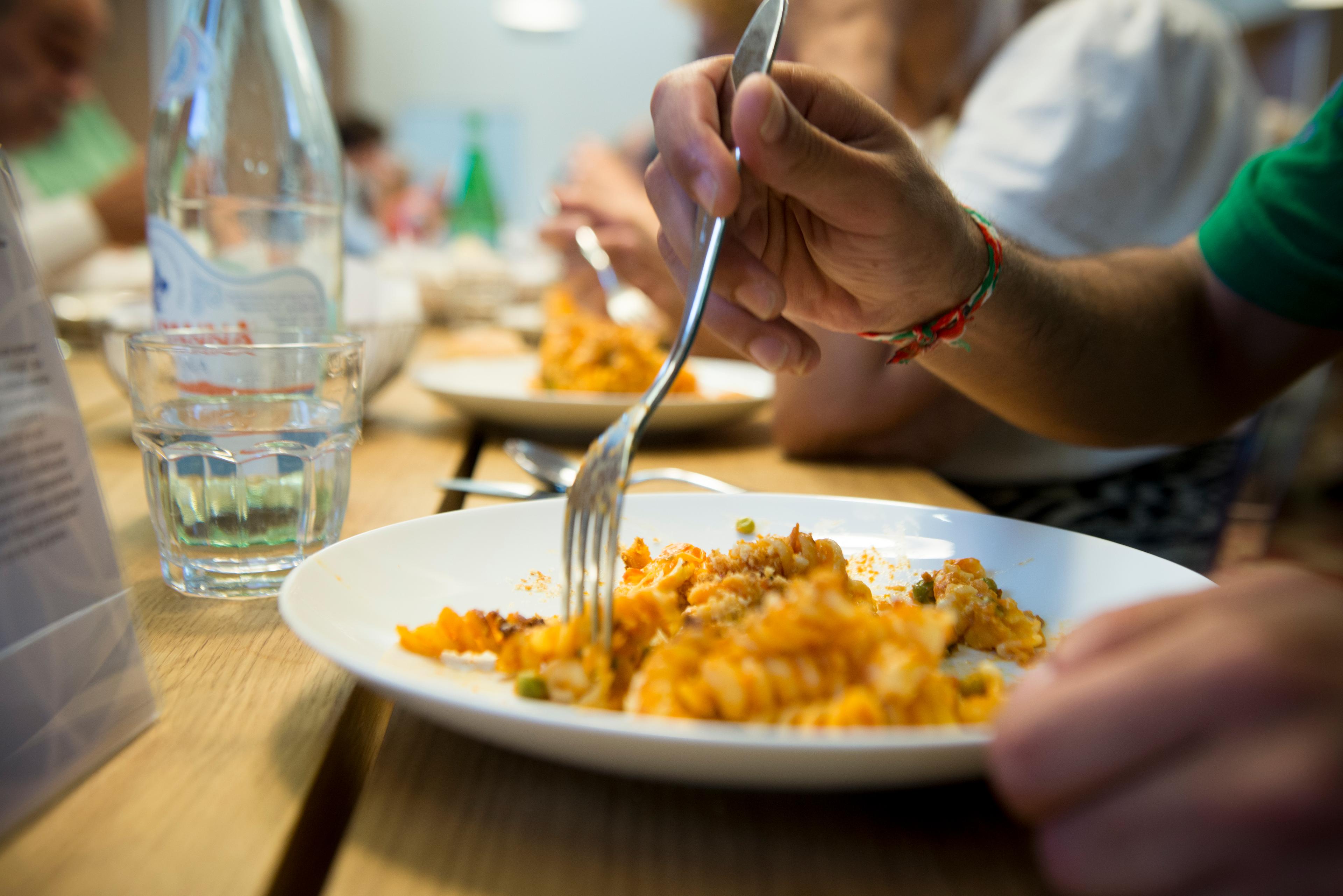
Diners eat pasta at the Refettorio. Credit: Paolo Saglia.
Many people may have the attitude that someone on the streets should be fed, but not necessarily fed with high quality food. The Refettorio’s existence rejects this. What do you feel about that?
This is not an attitude we can accept as a society. It is not about the quality of the food but rather about the dignity of the people and the respect we have for the food in our hands. How we care for food is a reflection of our values and culture. These values are the same whether we are feeding ourselves, our family, or our community – there is no difference between them. Quality is not a matter of cost or expense but one of interpretation and creativity. Food has its cycle of life, each stage presenting an opportunity to make something delicious if we look beyond the obvious. A standard of quality is not so finite in a chef's mind. In the social kitchens of Refettorio projects around the world, the quality of the meals we provide is not because we are buying exceptional ingredients, it is just the opposite. We are doing extraordinary things with ordinary ingredients. If we are to feed the planet, we have to break this cycle of good food/bad food.
Food can play an important part in someone’s life, beyond merely nourishing and sustaining them. How important is this aspect for someone who is homeless?
Food provides all of us more than just nutrition. Food feeds our mind. Food is convivial, a cultural connector, bringing us closer to one another. Preparing, serving and eating food is itself an art form that allows us to discover, create and build trust. For those who are vulnerable, such as an individual or family living unsheltered, food is not just necessary but essential. It is a chance to feel embraced by others with care and compassion, fulfilling needs that are more vital than nutrition alone. Refettorio projects are not just places that feed the body, they feed the soul for both those who give and those who receive.
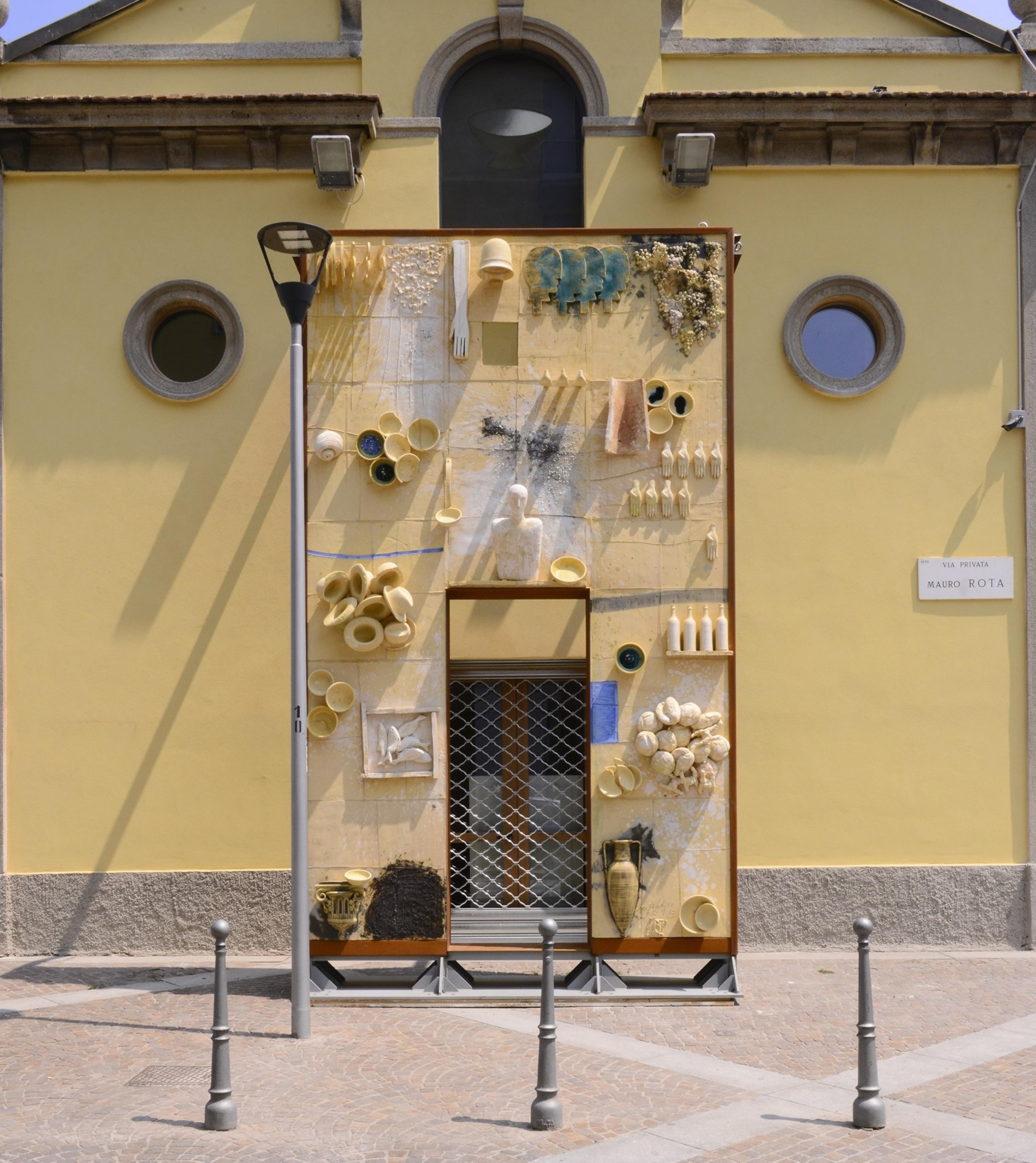
The entrance to Refettorio Ambrosiana, housed in an abandoned theatre in the Greco distrcit on the outskirts of Milan. Credit: Caritas Ambrosiana.
Massimo BotturaFood provides all of us with more than just nutrition. Food feeds our mind. Food is convivial, a cultural connector, bringing us closer to one another.
Can you speak about the communal aspect of the Refettorio – what does it mean for the people who dine there to be able to eat well with others?
The communal dining part of the Refettorio experience is another contribution to the overall magic of a Refettorio environment. Alongside delicious food served with hospitality, beautiful interior aesthetics, sustainable design, natural elements and high touch care, these important aspects play a unique role in delivering an experience that is personal to each guest. The Refettorio experience is a flow of positive energy that offers people space and comfort to connect with society, with services, with one another, in their own time. For some, dining in a communal environment is not easy and they may sit together with others but stay silent for some time, monitoring how things evolve around them until they are ready to open up. Day by day, the constant repetition of empathy and care supports each guest's well-being whenever and however they are ready to receive it.
What’s your first memory of being aware that some people do not have enough to eat?
That came from stories my grandmother and mother told me about World War Two. There was hunger and humiliation around that food insecurity for everyone during the war. Modena was not spared. We grew up with these stories and a deep appreciation for the food on the table and a no waste ethic in the kitchen. This is the same ethical lesson that Lidia Cristoni, the chef I worked with for many years at Trattoria del Campazzo, my first restaurant. She taught me how to use every ingredient twice. That is, once for the recipe we were serving to our guests and twice (again) using all the off cuts, vegetable trimmings, bones and extra material for our staff meals which were and still are very delicious. And that is how I learned that humble ingredients can make extraordinary flavours. That is how I learned that feeding the staff is important for the economy of the restaurant.
As I began to travel in my 20s, I also became aware of the food insecurity around the world from Asia to Europe to the Americas. As a chef, I feel particularly responsible to fix this problem, and to take action, not just words.
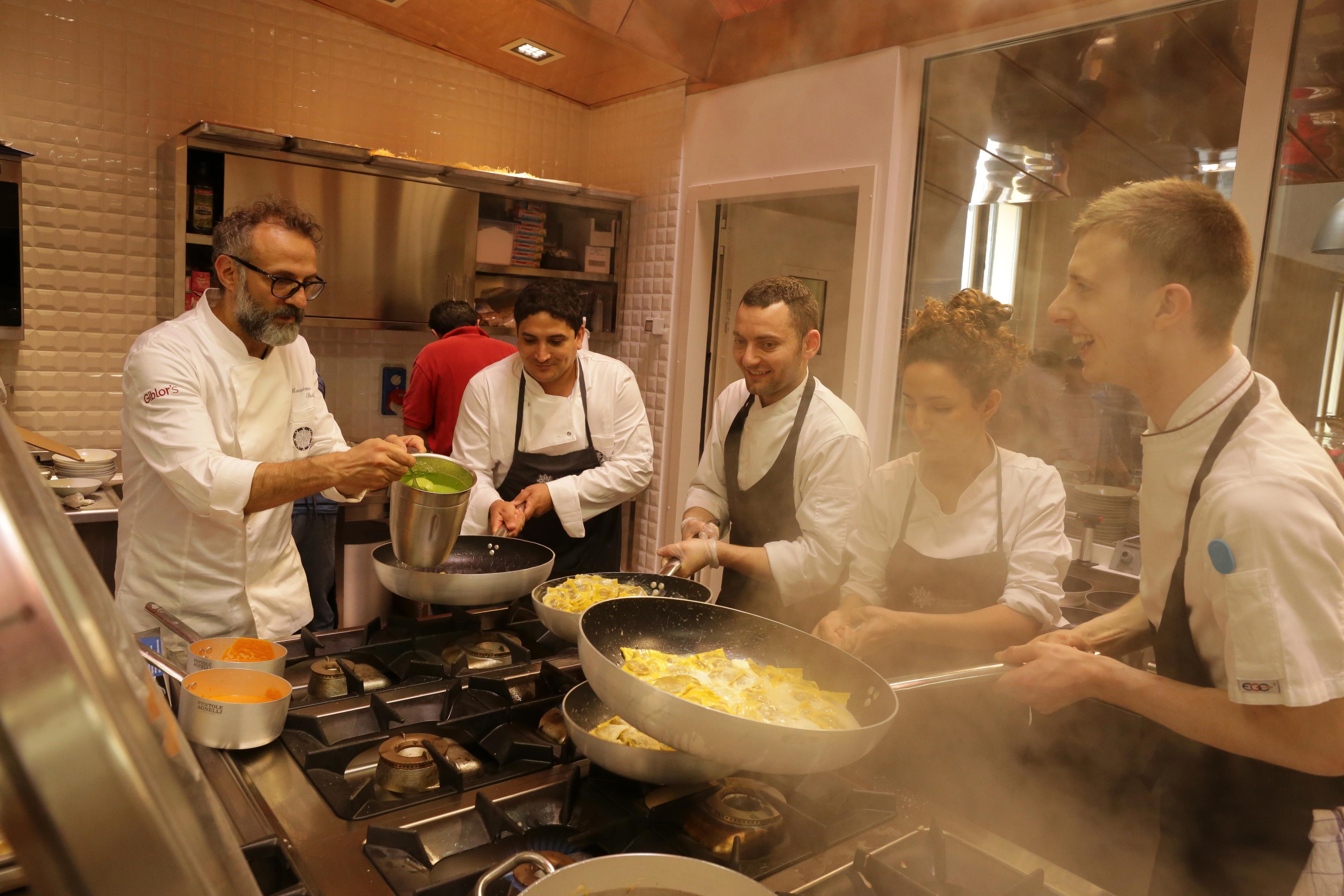
Chefs - including Massimo Bottura (far left) - in the kitchen of the Refettorio. Credit: Emanuele Colombo.
What responsibility do high profile chefs and restaurateurs have to tackle food poverty?
All of us working within the food industry play a significant role in cultivating a healthier food system. What we place on our menus, how we purchase, the way we support our local farmers, ranchers, fisheries, and artisans, can be a model from which others learn and emulate. As chefs, we have a magnificent opportunity to help lead the path towards sustainability. A good chef respects food and its cycle from seed to plate. Not all of us have been equipped with the knowledge to do so. We must look across our global culinary community for thought leaders, share information, be guides and mentors to one another, especially the next generation of chefs. We are all on a path of doing well by doing good, which means changing those habits we know negatively affect the environment, even if they cost less, to adopt ecological restorative and regenerative practices that support rather than destroy. These actions are essential in helping society change their perception around the value of food. As we become aware of the effects of our food choices, we also become aware of the inequities of our food system. Each of us with a platform has the opportunity to use our voice for change, helping not only ourselves but those around us who do not have the same access.These are the building blocks to ending food poverty.
Massimo BotturaDay by day at the Refettorio, the constant repetition of empathy and care supports each guest's well-being whenever and however they are ready to receive it.
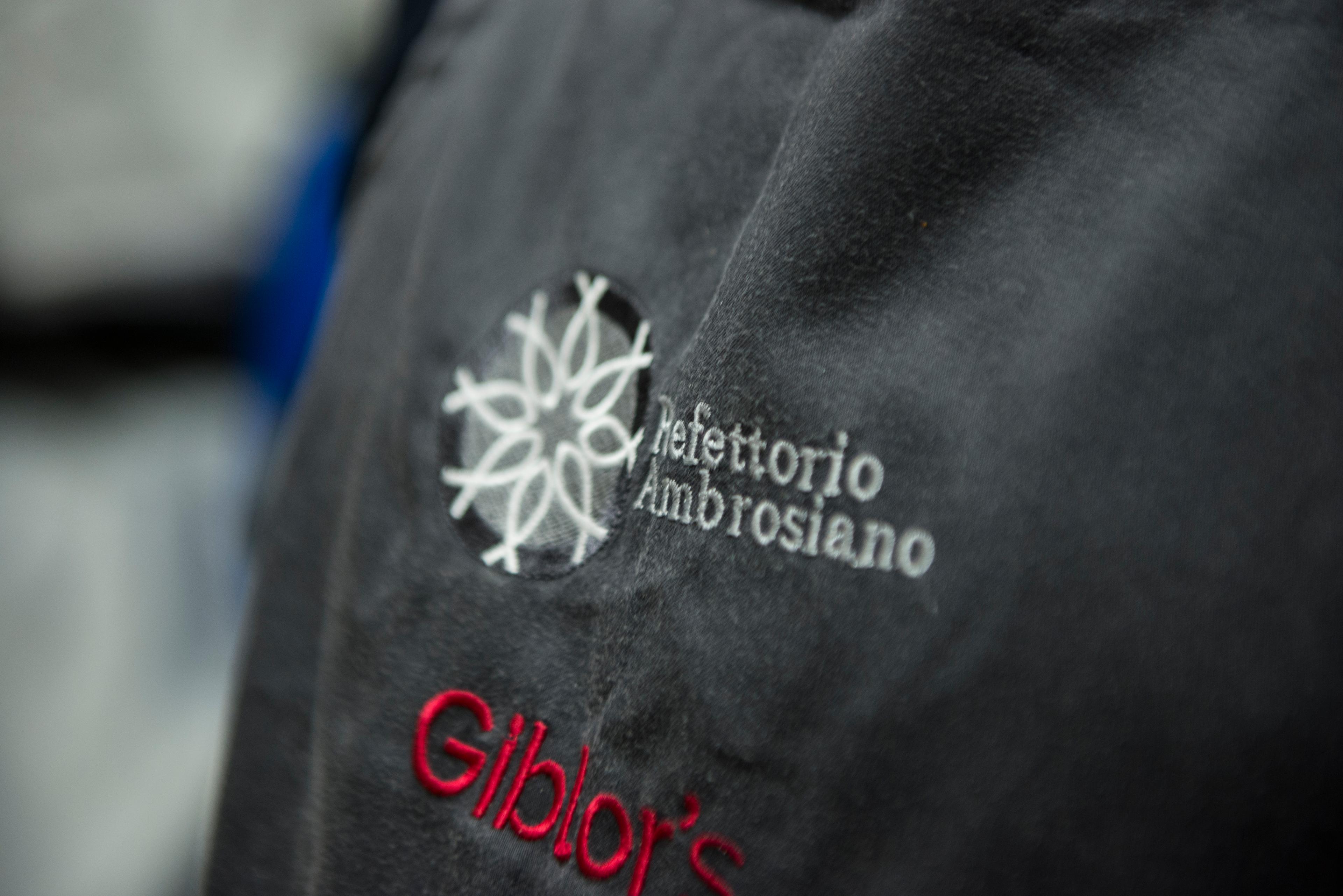
The logo of the Refettorio on the chef's aprons. Credit: Paolo Saglia.
Is there a creative aspect of using food items that would otherwise be considered “waste” if they weren’t salvaged by places like the Refettorio?
Food wastage around the world is massive with a large percentage occurring at the redistribution and retail level.We see the surpluses flow into food banks, and food recovery centers in bulk amounts. Unfortunately, many community kitchens lack the technology, human capacity or financial resources to further process this. Our Refettorio chefs are working on building creative strategies to get surpluses processed into a wide range of recipes that can be used in our hospitality programs and as staples at home. Yet, the amount that exists requires better interventions by food manufacturers, grocery and retail operators to do more. There is an opportunity to use what we call “byproducts” from further processing ingredients into specific portion sizes, cuts, meal kits and more. As an example, broccoli stems left from all of the broccoli florets packaged. There is both a market and opportunity out there if we think differently about food surpluses: where there can be economic gain not economic loss. We have to move away from labeling food as “waste” towards communications of how it can be saved and 100 per cent utilised.
How aware are you of the concept and mission of street papers? There are many shared values between street papers and the work you do with Food for Soul.
Scarp de’ tenis is a beautiful project. It embodies the mission of Food for Soul. To offer something so simple such as a piece of writing, a story, the daily news, to those living on the street is to see them as we see ourselves – not defined by circumstance or conditions but as a human. Much like a piece of art, street papers are a form of beauty that we often mistake as accessible and deemed unimportant to those in need, yet the sharing and giving of these simple gestures holds the kindness and love we need to transform the world for better.
To learn more about the work done at the Refettorio Ambrosiano and Food for Soul, visit www.foodforsoul.it


